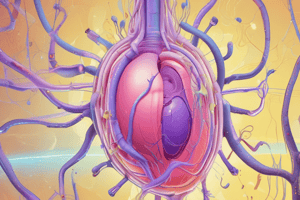Podcast
Questions and Answers
What is the primary role of erythropoietin produced by the kidneys?
What is the primary role of erythropoietin produced by the kidneys?
- Regulating blood pressure
- Balancing pH levels
- Promoting red blood cell production (correct)
- Facilitating calcium absorption
Which process is NOT a stage of urine production in the kidneys?
Which process is NOT a stage of urine production in the kidneys?
- Hormonal secretion (correct)
- Secretion
- Selective reabsorption
- Glomerular filtration
Which hormone produced by the kidneys plays a key role in maintaining blood pressure?
Which hormone produced by the kidneys plays a key role in maintaining blood pressure?
- Aldosterone
- Antidiuretic hormone
- Erythropoietin
- Renin (correct)
How do kidneys primarily contribute to the regulation of bone health?
How do kidneys primarily contribute to the regulation of bone health?
Which of the following is primarily reabsorbed by the kidneys during the selective reabsorption stage?
Which of the following is primarily reabsorbed by the kidneys during the selective reabsorption stage?
Flashcards are hidden until you start studying
Study Notes
Functions of the Kidney
- Kidneys are crucial for homeostasis, filtering blood and excreting waste and excess fluid as urine.
- Act as an endocrine organ by secreting hormones vital for bodily functions.
- Renin: Helps regulate blood pressure by managing fluid balance.
- Erythropoietin: Stimulates production of red blood cells, enhancing oxygen transport.
- Produce active form of vitamin D3 to aid in absorption of calcium and phosphorus, essential for bone strength.
- Regulate body pH by adjusting bicarbonate (HCO₃⁻) transfer between urine and blood.
- Control water levels by adjusting urine concentration based on environmental conditions.
Urine Production Stages
- The process of urine formation occurs in three key stages:
- Glomerular filtration: Initial filtering of blood to form filtrate.
- Selective reabsorption: Essential substances are reabsorbed back into the bloodstream.
- Secretion: Additional waste products are added to the urine.
Substance Concentrations
- Water and various solutes are filtered and processed, with distinct concentrations in urine:
- Protein, glucose, urea, uric acid, ammonia, creatinine, sodium (Na⁺), potassium (K⁺), chloride (Cl⁻), phosphate (PO₄³⁻), and sulfate (SO₄²⁻) typically show low or zero concentrations in final urine, indicating effective filtration and reabsorption processes.
Studying That Suits You
Use AI to generate personalized quizzes and flashcards to suit your learning preferences.



